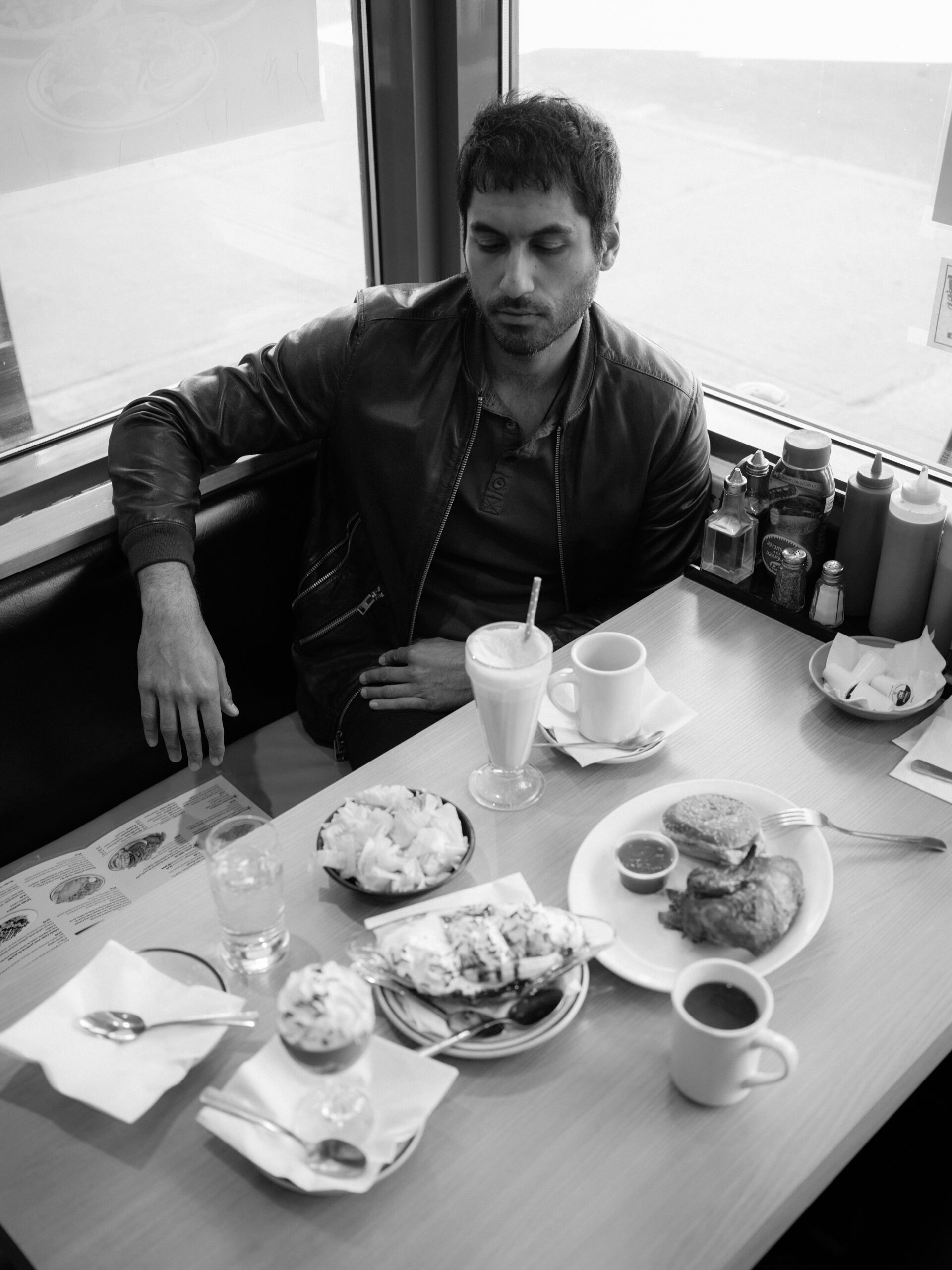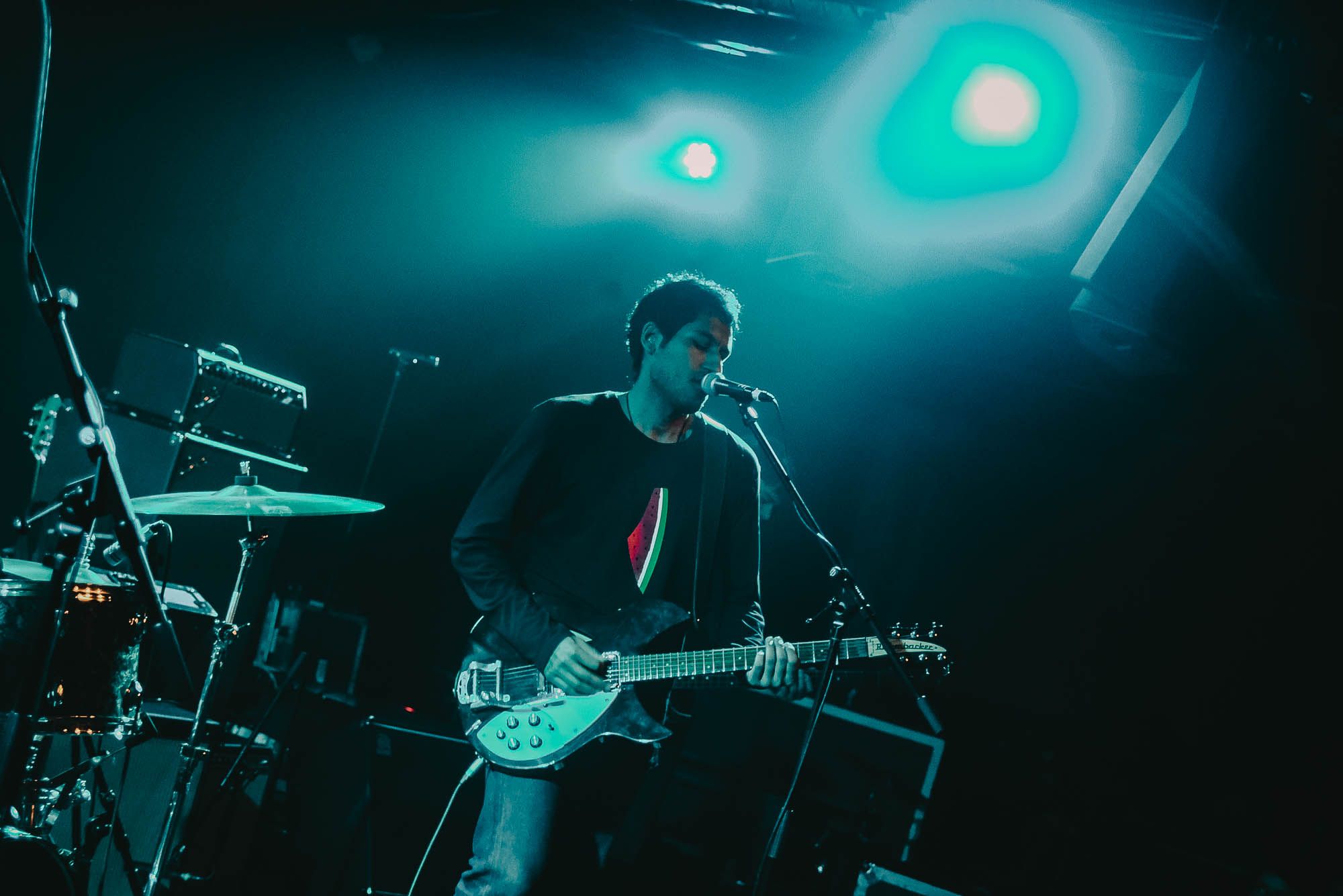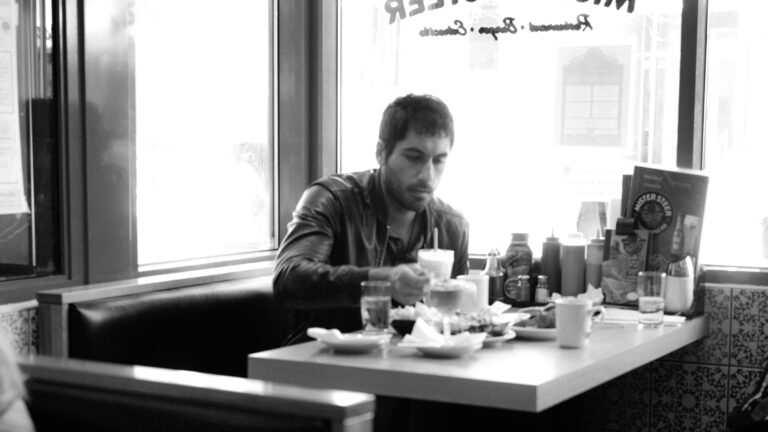Additional Information
One year after Montreal rock outfit Karma Glider’s debut EP, comes their anticipated followup, Ocean Honey Violence. Mashing up the group’s signature shoegaze pop-rock aesthetic with new Britpop, hip-hop, and DnB influences, the band’s main creator Susil Sharma has delivered a succinct project that evokes sunshiney days and feverish, sleepless summer nights.
Throughout its short, 21-minute runtime, we hear a new chapter of taste and influence from Sharma, who seems to have refined his extensive musical career to date into something much more distilled and polished. PAN M 360 sat down with Sharma to discuss the EP, its creation, its influence, and how Hunter Biden fits into it all.
PAN M 360: Another summer, and now another Karma Glider EP. How’s the reception felt since the release and the launch party at Quai des Brumes?
Susil Sharma: So far, it’s been really good, especially playing it live. The response is really nice. I think it’s maybe changed a little bit since recording it. The kind of full-band live energy.
PAN M 360: What was the initial inspiration behind the AI soundbites about your band on “Back”?
SS: It started as an instrumental track—a more interlude-type thing. And then I was just fooling around at one point and looking for samples. And I remember that my friend had told me about some super sketchy AI voice-generating sort of site. It’s a bit funny to me, because, to me, it’s really obvious that it’s not real. But then some people were like, “How’d you get Joe Rogan on here?” There’s a clear point where, as soon as he says, “Karma Glider”’, it doesn’t sound like his voice very much to me. I found it kind of funny. Obviously, Joe Rogan’s not talking about me or this whole mythology of my years-long career. I just stole his Axl Rose commentary.
PAN M 360: Do you see yourself using AI more in the future? Or was it more about the novelty this time?
SS: I think there could be a potential use for it. It’s obviously pretty beyond the pale in some ways, in the sense of what ethical dilemmas there are to it. There’s also ethical dilemmas to sampling. I was looking at a more generative website where you can input like, “I want a Philadelphia soul sample with these instruments that sounds like it’s from this era.” It’s just a free website, and it’s starting get pretty good. Now, instead of having to crate dig to find a drumbeat, you can just find something [with AI].
Who that belongs to, I guess, is a weird thing to think about. It’s one thing in the realm of like, DIY, or Lo-Fi-ish music. On the level of major pop stars, it’s probably a different kind of vibe, but I’m just kind of into it. Like the pirate in me is just like, “Sick.” I was already just stealing stuff off YouTube.
PAN M 360: You mentioned in another interview that you’d also been working on an LP when you diverted your focus to this project. Is the LP still something you’re pursuing?
SS: Definitely. I’m actually kind of just getting back into the flow of that. I’m hoping to, ideally, chase that for the end of the year. But I think it was really good in terms of workflow, because I was very myopic about finishing this really big project. And it almost became like a task, starting to feel like I needed to tick boxes off. And then this EP was kind of created with the mentality of pressing pause on that and to just be free—just create whatever, really quickly.
The songs don’t really have much structure. They’re more open. It’s really fun, and the collaboration is really loose. And I think now that I’m coming back to the LP, I’ve learned a lot in the process of just reconnecting with aimless creativity. In my life, I’m philosophically trying to tap into that. Essentially just trusting myself, collaborators, the universe, whatever. Being a bit less rigid about having to churn whatever result out.
PAN M 360: Ocean Honey Violence feels a lot more laid-back than much of Future Fiction. Can you point to anything in particular that brought this EP’s different energy?
SS: I got a little bit more hands-on. I think most of the guitars were recorded at home, and then fed through a TASCAM. I mixed it later with my friends Adrian [Popovich] and Joseph [Donovan] who produced the record. But in the past, guitars were too sacred, almost. Like, it had to be the perfect tone. I think maybe just doing things on my own, living with imperfections, and in fact, embracing that, informed the sound.

PAN M 360: Have you considered yourself something of a perfectionist in the past?
SS: I think so. And it’s interesting because I’ve really been analyzing that. What that idea of perfection is, and where does that come from? And I realized that it’s just based on something someone else did. And they just made it up. So instead of rigidly trying to recreate The Strokes’ guitar tone or something, just be free and make something up yourself.
I’ve been making music for a little while, and I noticed sometimes in myself that if there’s an expectation and a goal, like “I have to make this EP because it has to break my band, and I have to get on some blog, and my YouTube video has to get whatever,” it kind of takes the fun and the magic out of making art. I’ve seen it in myself when I deprive myself of the joy and the privilege of really making art. So maybe I’ve been guilty of doing that a bit in the past, but this time around, I just let myself have fun.
PAN M 360: I heard that you initially planned this to be a 3-song EP with each track touching on one of the title’s words. What was the initial inspiration to touch on the words ocean, honey, and violence?
SS: They kind of just appeared. I think I was freeform writing, and those words kind of seemed to group themselves together. It kind of struck me later that they’re kind of things that I have difficult relationships with. I’m kind of scared of open water in the ocean. I write about that a lot. And sugar—I’m a recovering addict, and I’ve definitely sometimes noticed that I eat ice cream the way I used to drink alcohol, like trading addictions. Violence, I’m scared of. And it’s almost a part of the world we live in, in these weird underbellies.
PAN M 360: You’ve got an unlikely blend of influences working on this album, especially with the nods to hip-hop. Who are some rappers and producers you’re inspired by?
SS: Definitely a lot of Golden Era, early 90s boom bap: The Bomb Squad, Public Enemy. To me, those are kind of the coolest-sounding records of all times, so I’ve always been influenced by those. There’s actually a lot of DnB and jungle influence, especially on the last song. Maybe Timbaland a little bit? I’m also into Tyler, The Creator and there’s this dude, Mike, from New York who I’ve been into recently—he’s so good. So a lot of that kind of like minimalist, modern, alternate hip hop is, honestly, kind of the most interesting sounding music being made right now.
PAN M 360: Have you always been a hip-hop head? Or was that an interest you developed separately from band music?
SS: I dip in and out. I do think all that older stuff, Rick-Rubin-produced shit is pretty synchronous with punk music. I think I maybe dipped out a little bit around the turn of the millennium when things seemed to get hyper-commercial. And that’s when I was a teenager, so 50 Cent records were just not really my bag. But lately, I’ve been finding a lot of stuff that’s really good.
PAN M 360: Reading about your work, I’ve noticed a lot of comparisons, whether that’s people comparing your sound to other bands or simply comparing Karma Glider to Heat. What are your thoughts when you get a comparison like that?
SS: I’m into it. I’m under no pretension that I’ve created some new sound. I’m pretty blatantly taking elements from other stuff. It is kind of funny sometimes when people compare Karma Glider with Heat, because they’re two different bands with different people, and it’s essentially just me singing and playing guitar as the common thread. With all the other comparisons, I’m super flattered. I don’t think I’ve received any negative comparisons. Usually it’s like, Oasis, The Jesus and Mary Chain, we got The Killers recently. With a lot of the songs, it’s like, “This is the Rolling Stones-inspired song, this is the Velvet Underground track.” I’ve been listening to a lot of Spacemen 3 recently, and I was looking at some old reviews. People were like, kind of almost dissing them, being like, “This is just Can and The Stooges.” I was like, “I love Can and The Stooges.”
PAN M 360: To you, what’s the line between an influence and a rip-off?
SS: I was watching a video taking apart Led Zeppelin songs. And here’s a line they totally stole from a different band, like 100% the same. So, I guess they just took that one. But to me, they still rule. So I don’t know. Honestly, personally, I don’t think it makes me feel like it’s less authentic. Sometimes it’s interesting to think about the ‘60s garage rock bands. There would be regional acts like Paul Revere & the Raiders, and The King’s Men, and all these local garage bands that would all have different versions of “Louie, Louie”, and they’d all chart locally because there wasn’t a central thing. So they’re all kind of doing the same songs in the same style with just subtle nuance, which is almost more interesting than saying “Only X band can sound this way.”

Karma Glider live by Stephan Boissonneault
PAN M 360: Does it ever feel like you have something more to prove considering the success of your previous band, Heat? Or are you just saying fuck it and moving forward?
SS: It does, for sure. I think it’s a very human thought, in any aspect, to compare yourself to other people or where you were at at one point in your life, or where you think you’re supposed to be at. And it’s up to you, when it gets trapped up and you ask, “How come I’m not in this magazine, or making a living off this?”
Those things become intertwined with my view. Am I a valid artist or musician? Or even a person? Am I productive? That’s engrained capitalism, I guess. Ultimately, the goal is like, could I just go off on an island with a guitar and make music, knowing no one would ever listen to it, and have fun with it? That’s the point of this at the end of the day.
Heat broke up in 2017. And by the time I started putting up music again, Spotify had become so much more important. Now there’s just so many different metrics of social media, creating content, and being viral. And I don’t really care. It’s cool. It’s a tool, I guess, but that’s not really why I do this.
If I’m not careful, I can start to feel inadequate. Like, how come this song I posted gets, like, zero likes, but then I’ll post some thirst trap and get validation? Should I start making sexier music? I don’t know, it’s just easy to lose yourself in that, versus playing a show and just talking with people. It’s just a much more direct, real connection.
PAN M 360: How does collaboration with other members of the band fit into your songwriting method?
SS: It’s been a lot of time working out the live show. My bassist [Jean-Philippe Bourgeois] and drummer [Jean-Philippe Godbout] were on the first EP. And then on this one it’s just me, and the drummer, and my friend, Matt [Perri], who’s not in the band, and sang backups. I collaborated pretty closely with the drummer on a lot of these tunes, because I think they’re more dancey, so focusing on the groove rather than changes is something that we worked on a lot. I feel like I learned a lot from making the EP, collaborating with someone that way. Once we started learning the songs for the live show and playing. It was like, “Oh, this actually sounds super sick. I should have recorded with this band.” So I’m looking forward, especially with this LP that I’m working on now, to get the guys on the record more. And it’s also just more fun to collaborate.
PAN M 360: You’ve mentioned the track “Hunter” being inspired by both your cat’s predatory instincts and also the perspective of Hunter Biden. This went way under the radar in the interview I heard, so I just have to know more about the inspiration behind it.
SS: I had that riff lying around for a long time, and it’s more the type of song where it’s pretending to be someone. I just asked, “What is this character, who’s it personifying?” At that time I, like many people, was just obsessed with American politics. So I was reading a lot, and the Hunter Biden story is crazy. And then moreso looking at it from a sympathetic angle—this sacrificial lamb. A crack addict son to a career politician who was thrust into the spotlight.
I read an interview with him where he said the fate of democracy rested on him staying sober. I was like, damn. That’s a crazy thing to think about. What would it be like to be there? Ultimately, I’m pretty sympathetic—almost like he’s trapped in this way of being. I’m nine years sober at this point. But I’ve been in positions where I felt powerless to addiction. If you want to call that a disease, or whatever, there are different viewpoints on it. But I can relate to this person on that level. I honestly feel deep empathy for someone who would have to go through that on that scale. I’ve gone through moments where I was giving in, and like, “Fuck it, let’s go, let’s call the crack dealer, let’s get the rocks out, or whatever.” So I bet when Hunter Biden does that, it’s pretty fucking epic.I had also adopted a cat around that time, and I was just watching him hunt for bugs and appreciating how we’re all kind of set up to play out these roles in a lot of ways.
PAN M 360: There are a lot of lyrics on this album that relate to substance use, sex, and falling apart. The tail end of the rockstar lifecycle. What’s changed between now and when you were going through some of these things?
SS: The way I think about a lot of that stuff now, and often why I’m drawn to that imagery, is because it still represents the shadow self that’s seeking some sort of expression. There are darker parts to all of us. And for some people, that goes to a needle, or a bottle, or whatever. It manifests in different ways for different people. And now that I’ve gotten clean from substance, it’s still there. It’s still kind of seeking some sort of home. “Sugarcane” is kind of about that—about different ways to numb it out. I think our society is so full of that: Rewarding not being present; avoidance. And that’s part of being a human being.
So I’m kind of obsessed with it, because that’s still there inside of us— that desire to escape. I’m constantly fantasizing about buying a ticket somewhere and fucking off from all my responsibilities. But how do I acknowledge that stuff and live with it, but also be planted, and mindful, and enjoy the shit that I love? And the shit that I love just happens to be rock and roll.
Press Photos by Yang Shi
























